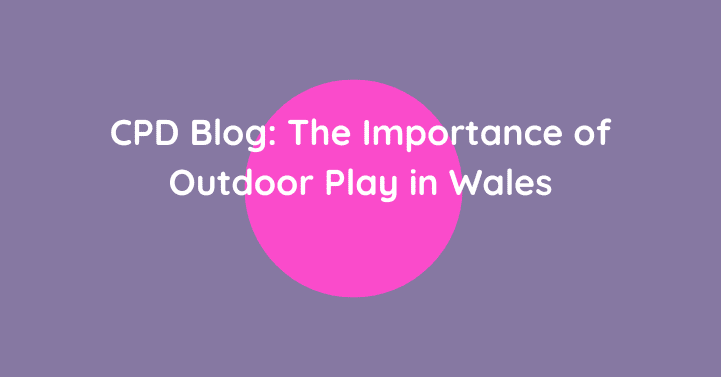The Importance of Outdoor Play in Wales
A Research-Informed Guide for Teachers & Practitioners
Aligned with the Curriculum for Wales 2022
1. Why Outdoor Play Matters in Wales
The Curriculum for Wales 2022 places outdoor learning at the heart of its vision.
It emphasises that learning should be:
-
experiential
-
engaging
-
active
-
authentic
-
deeply connected to the learner’s context and community
Outdoor play helps achieve this vision by creating meaningful, real-world experiences that support all Six Areas of Learning and Experience (AoLEs).
It is also supported by:
-
The Foundation Phase (historical basis of early years)
-
Health and Wellbeing AoLE
-
Learning for Sustainability (LfS)
-
Welsh Government Outdoor Learning Guidance
Wales is committed to ensuring all children experience high-quality outdoor learning as part of their daily entitlement.
2. Research That Supports Outdoor Play
1. Cognitive Development & Academic Progress
Outdoor learning increases engagement and deepens understanding.
Evidence:
-
Rickinson et al. (2004) – outdoors boosts retention and understanding
-
Fjørtoft (2001) – natural environments improve cognitive and motor development
2. Physical Health & Movement Skills
Outdoor environments encourage natural movement, balance, strength and coordination.
Evidence:
-
Brussoni et al. (2015) – risk-rich outdoor play supports resilience
-
Tandon et al. (2018) – children are more active outdoors than anywhere else
3. Emotional and Mental Wellbeing
Nature reduces stress and promotes calmness.
Evidence:
-
Wells & Evans (2003) – natural spaces buffer stress
-
Kelz et al. (2013) – nature improves emotional wellbeing
4. Social Skills and Independence
Outdoor play offers more space to collaborate, negotiate, problem-solve and take responsibility.
Evidence:
-
Sandseter & Sando (2016) – outdoor environments build confidence and risk awareness
3. Outdoor Play and the Curriculum for Wales
Outdoor learning supports ALL 6 Areas of Learning and Experience:
1. Health and Wellbeing
Movement, emotional regulation, confidence, risk-taking, resilience.
2. Humanities
Learning about nature, place, culture, sustainability, and the world around them.
3. Science & Technology
Hands-on investigations, forces, materials, habitats, weather, the natural world.
4. Mathematics & Numeracy
Real-world measuring, shape, problem solving, patterns, number explorations.
5. Languages, Literacy & Communication
Storytelling, descriptive language walks, role-play, outdoor vocabulary building.
6. Expressive Arts
Dance, movement, clay modelling, natural art, creative performance outside.
Outdoor learning supports the four purposes of the Curriculum for Wales by helping children become:
-
ambitious, capable learners
-
enterprising, creative contributors
-
ethical, informed citizens
-
healthy, confident individuals
4. Outdoor Play and Inclusion/ALN in Wales
Outdoor learning supports the Welsh Government’s commitment to ALN reform, ensuring learning environments remove barriers and respond to needs.
Outdoor spaces are especially powerful for ALN pupils:
-
Reduced sensory overload
-
More space to regulate and move
-
Lower social pressure
-
Calming natural sensory input
-
Increased choice and autonomy
-
More opportunities for communication
-
Hands-on, concrete experiences
-
Higher engagement
Evidence:
-
Änggård (2011) – outdoor learning supports neurodiverse children
-
Barrable (2019) – nature supports emotional and sensory regulation
Outdoor learning is inherently inclusive, making it one of the most effective ways to support ALN learners across Welsh schools.
5. Example Outdoor Learning Activities in Welsh Settings
Foundation Learning / Early Years
-
Puddle exploration
-
Outdoor phonics
-
Bug hunts
-
Stick counting
-
Natural mark-making
Primary (Years 1–6)
-
Maths trails
-
Shadow and light experiments
-
Storytelling outdoors
-
Habitat investigations
-
Natural art
Health & Wellbeing
-
Nature walks
-
Mindfulness outside
-
Cooperative team challenges
-
Rope paths for regulation
6. The Muddy Puddle Teacher® Toolkit for Wales
Our Toolkit aligns closely with:
-
Play-based, experiential learning
-
Wellbeing and movement
-
Outdoor learning as a daily entitlement
-
Sustainability and upcycling
Toolkit Methods That Support the Curriculum for Wales
1. Bamboo Method
Structure for maths, shapes, measurement, boundaries, angles.
2. Rope Method
Science investigations, problem-solving, team-building, space marking.
3. Clay Method
Expressive arts, sensory support, modelling in science or literacy.
4. Stick & Stone Method
Sorting, STEM tasks, storytelling, construction, numeracy.
5. Puddle Play Method
Science, language development, descriptive vocabulary, curiosity-based learning.
6. Loose Parts & Upcycled Method
Creativity, construction, engineering tasks, imaginative play.
7. Reflection Questions for Welsh Practitioners
-
How does outdoor learning currently feature in our Curriculum for Wales planning?
-
Which AoLEs could we take outside more often?
-
How does outdoor play support our ALN learners?
-
How can we embed the four purposes into outdoor experiences?
-
What Muddy Puddle Teacher® method can we introduce this term?
-
How do we ensure outdoor learning is equitable and accessible?
8. Next Steps for Welsh Schools & Educators
Strengthen your outdoor practice with:
-
The Muddy Puddle Teacher® Level 1–4 Programme
-
ALN-specialist outdoor courses
-
Curriculum-based outdoor learning modules
-
Whole-school training days
-
Free demonstrations on our social media pages
For Welsh school bookings, bespoke curriculum support or staff development:
info@themuddypuddleteacher.co.uk


